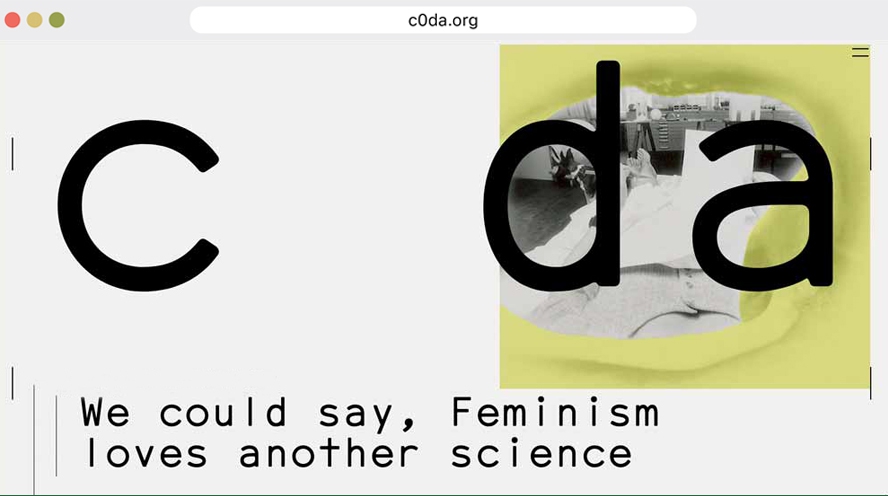c0da.org
c0da is a research project and publishing platform conceived by artist Katrin Mayer that deals with feminist modes of coding and writing. Developed during a grant of the Berlin Artistic Research Programme* (2020 / 2021) and in close collaboration with graphic designer and programmer Anna Cairns, it interweaves the herstory of the internet with herstories of writing.
On the one hand, c0da relates to programming, which used to be a female practice, and its respective protagonists, their skills and stories, which were written out of history.
Following a parallel, methodological line, c0da addresses modes of writing that emerged as a reaction against hegemonic masculinity, with attention to the materiality of language, like l’écriture féminine.
The commissioned textual and visual contributions reflect on shared potentials intrinsic to the idea of the web while also featuring in the politics of feminist writing, like:
polyphonic voices, intertextual appropriations, an interest in automatic writing, shared research instead of genius, translation processes, having an affinity for subjects that are not One, sociality, weaving and networking skills, glitches, a topological notion of thinking and space, etc.
As a connective motif, Katrin Mayer proposes the figure of the zero. It belongs to computer code but also to the “zerological subject”, a term by Julia Kristeva that was later revived and underlined by Eva Meyer. Here, identity, self and writing are seen as movements and practices eager to elude a binary logic and to not subordinate themselves to the sign.
The zero furthermore has the plastic capacity to shapeshift into the letter O, a circle, a hole, a void, a bowl, a dot, a Western Arabic 5: ٥, an ellipsis, a Moebius strip and into the gender sign in Anna Cairns’ typeface for c0da. These zerological figurations create different appearances and connotations in the contributions to this website.
The project started with general questions around the internet and whether there is such a thing as “internet-site-specificity,” followed by research into the involvement of women in the emergence of the web. As studies in recent years have shown (e.g. by Kathy Kleiman, Wendy Hui Kyong Chung, Claire L. Evans), programming had in the early decades of computing mostly been the job of women, but they were hardly ever credited for it.
Whether they were math majors and linguistic talents like Grace Hopper, information scientists and embodied search engines like Jake Feinler, or computer scientists with enthusiasm for multimedia and hypertext like Wendy Hall, their skills shaped the way code was written. c0da thematizes language, research and linkages, and thus addresses the internet through its internal feminist perspective: it simply would not exist without the work of these women and their respective talents.
Contributors to c0da.org are: Ann-Kathrin Eickhoff, Sophia Eisenhut, Sarah Lehnerer, Hanne Loreck, Jasmina Metwaly, Karolin Meunier, Eva Meyer, Sadie Plant, Ido Radon, Romy Rüegger, Bea Schlingelhoff, Eske Schlüters, Andrea Scrima, Jana Seehusen, Stanton Taylor, Katrin Mayer, Anna Cairns.
.
.
* Artistic research commissioned by Berliner Förderprogramm Künstlerische Forschung, supported by the Senate Department for Culture and Europe, Berlin
https://kuenstlerischeforschung.berlin/events/754/
.
.
